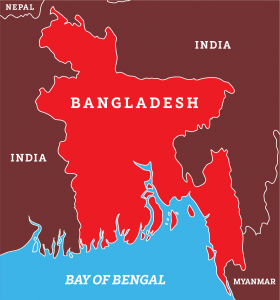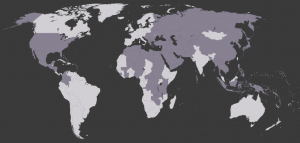Bangladesh: A Rigged Election

Why It’s Important
Bangladesh’s Sheikh Hasina consolidates her grip on power in heavily rigged elections.
Her near clean sweep means she is likely to continue a program of undermining independent institutions and the media.
Economic growth has been high and sustained for the past decade but inequality is worsening.
The overall risk is eventual pushback from a population that has shown a willingness to take to the streets with demands for improved governance.
Rigged Elections Amid an Economic Boom
It seems that Sheikh Hasina of Bangladesh could not resist rigging herself not just an election victory but a near complete sweep of parliamentary seats. In polls on December 30, her Awami League party and its Grand Alliance partners took 288 constituencies, leaving just 8 so far for an opposition coalition that has been battered by her increasing repression. While Hasina rejected allegations of rigging, the developments bode ill for Bangladesh, which through 50 years of turmoil has remained committed to the idea of democracy.
Awami League loyalists mention Malaysia as a model for Hasina’s Bangladesh: a single party in power indefinitely running an economic success story, unthreatened by any opposition but occasionally holding polls to remind everyone of its overwhelming popularity. Malaysia before the fall of their ruling UMNO coalition last year is not a bad comparison with Bangladesh today: rampant corruption, dramatic inequality and increasing pressure on the judiciary and repression of media and civil society.
This playbook is familiar: lock up your main opponent on corruption charges, disappear opponents such as journalists and critical academics and when challenged, shrug that they have probably gone abroad. Next, restrict the Internet, install partisans in all key positions, keep the military satisfied with new weapons and contracts and find loyalists among the newly moneyed. With Bangladesh’s growth among the highest in the world, its capital Dhaka is full of a rising new elite of textile factory owners whose interests are entirely economic.
Tepid International Response
India and China, now in a tense competition for influence in Bangladesh, were quick to congratulate Hasina on her victory. The United States and the European Union, which issued strong statements of concerns about reports of harassment, intimidation and violence during the pre-election period, will probably accede anyway, mindful of the fact that Bangladesh is host to a million Rohingya refugees from Myanmar who are unlikely to return home soon. Hasina’s decision to protect them has endeared her to many at home horrified by the violence against fellow Muslims. It means she is unlikely to be challenged from the West, who want to avoid the humanitarian catastrophe that would result if the refugees were forced home. This could also have domestic consequences: Hasina would lose support of the Hefazat (Islamist movement based in Chittagong, around the Myanmar border) with which she’s informally allied.
What’s Next for Bangladesh?
Has everything aligned to ensure Sheikh Hasina a peaceful term in office? Will the 71-year-old daughter of the founder of the country pass on her leadership to her son, Sajeeb Wazed? Nobody knows but she has been in power long enough to be isolated, vain and potentially vulnerable. She is the first prime minister to serve three successive terms and there is little sign of the military, the traditional arbiter of power in Bangladesh, taking her on. Indeed, the soldiers, especially the top brass, look so well-fed, well-armed and sleek these days that they will likely be content as long as the economy does not falter. The old Bengali intellectual elite that once shaped the country’s strong democratic identity has found itself sidelined by the nouveau riche. Mirrored glass apartment buildings have replaced their colonial manses with their lawns and mango trees.
Yet, there are clouds on the horizon. Dhaka, among the fastest growing cities in the world, is a magnet for approximately one million people, who, displaced from watery farms by climate change and drawn by factory jobs, flock to the polluted capital each year. Precipitous urbanization foments tension: Dhaka suffered serious rioting in 2018, when days of violence were provoked by the killing of two students by a speeding municipal bus. Any number of other issues could provoke the same violence while the systems that respond to the people’s needs become increasingly brittle.
Growth has been remarkable and will likely continue to be so, particularly if the trade war between China and the United States escalates. But while the country has become the global hub for cheap manufacturing, its growth has not percolated down to the poor, in the way that it did in the past. Bangladesh once had a strong record of pulling people out of poverty but that is faltering. The rich are getting richer and pay very little tax. Almost all government revenues come from a regressive goods and services tax.
Founded in 1971 when its military rulers in then-West Pakistan refused to allow the results of an election to stand, Bangladesh has always been a flawed democracy. Its politicians have long held a corrosive winner-takes-all view of elections; to be in opposition is to be in jail. Elections are corrupt and violent; at least 17 people died on December 30th. Yet, there remains a persistent faith in democracy that is likely to be Sheikh Hasina’s eventual undoing.

